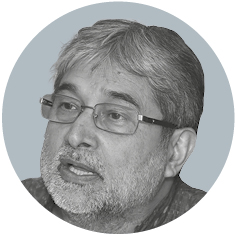Letters
Dangerous narratives

Not even 2/3 there yet
D+C/E+Z e-Paper 2018/05, p. 14: Hans Dembowski: Overwhelmingly positive progress
The western development paradigm is rightly under attack. It has not delivered what it should have after being hegemonic for over four or more decades. The issue is unfairly categorised as a leftist/right-wing issue which it is not. The vital statistics indicators the editorial refers to should have actually ceased being topics of concern a long time ago. As the western development paradigm has not delivered, it needs to be replaced, not improved. Have “reason, science and humanism” (humanism?) led, as your editorial states, to “dramatic progress”? We are not even 2/3 there yet. And no, “intelligent policies based on empirical evidence” are not what is going to change the inequitable balance of power the world over. Empirical data does not speak for itself, it must always be analysed from a political perspective. It is impossible to judge in an “unideological” way whether progress is fast or slow. Empowerment of the poor is needed, not more numbers crunching.
Claudio Schuftan, Ho Chi Minh City
Worse than factual inaccuracies
D+C/E+Z e-Paper 2018/05, Focus: Dangerous disinformation
I doubt that your approach to the topic really hits the target. I’ll happily admit that I do not specialise in media matters, but I do follow the debate in Germany, the EU and the USA.
As I see it, factual inaccuracies are not the problem. I keep listening to the news on Germany’s public radio, and it always includes at least one inaccuracy. That is probably inevitable, because perfect quality control would be unaffordable. Sometimes, moreover, news agencies correct mistakes they made, but other media have already processed that news and are unable to iron things out again.
What is really dangerous in my view is how narratives are set. (Obviously you are applying such a narrative yourself.) My impression is that German media refuse to reveal and even less debate how narratives are set. Manipulation is done via narratives. This is quite dangerous, given that the media shape public opinion.
Applying this analysis to your focus section, I find my view confirmed.
Hans-Jochen Luhmann, Wuppertal
Editor’s response:
Hans-Jochen Luhmann correctly points out that narratives matter. At D+C/E+Z, however, we do our best to rely on fact-based and well-reasoned narratives. How we handle the issue of populist politics, for example, is
inspired by Jan-Werner Müller, the political science professor at Princeton Uni-versity.
His core argument is that populist leaders define who they consider to be “the people” arbitrarily, claim to represent those people personally and deny the legitimacy of everyone else. By contrast, the democratic approach is to accept that society includes diverse interests. The implications are that diverging approaches to various issues are entirely legitimate and that any serious debate must involve voices from different interest groups. I have reiterated this definition several times and reviewed his book on the matter in our D+C/E+Z e-Paper 2017/02, p. 39.
In a similar way, our approach to other issues is guided by reasoned arguments made by scholars, policymakers and civil-society leaders on the one hand and universal human rights on the other. We do our best not to promote irrational ideologies.
Hans Dembowski














